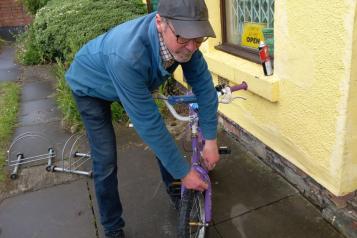Looking after your mental health all year round

Why is looking after your mental health important?
We know how to care for our physical health and what to do when we're unwell or injured. We should do the same for our mental health when we're not feeling quite ourselves.
We can do a lot for our mental health and overall wellbeing. It is helpful to know some of the symptoms of depression and anxiety, and identifying these can help decide what care and support we need. It’s important that we should seek professional support where and when self-care hasn't been effective.
What signs should we look out for?
Depression and anxiety can present physically and psychologically. While mental health conditions are more common than you may think, not everyone will suffer the same symptoms or experience mental health issues in the same way.
Here’s what to look out for:
- Persistent low mood.
- Loss of interest in previously enjoyed activities.
- Significant weight gain or loss.
- Increased or decreased appetite with loss of interest in food.
- Changes in sleeping patterns, fatigue or low energy levels.
- Extreme feelings of worthlessness, guilt or worry.
- Difficulty concentrating or making decisions.
- Loss of interest in personal care, hygiene and general wellbeing.
- Suicidal thoughts.
How to care for your mental health?
Here are some ways you can lift your spirits:
- Breathe. Experiencing periods of depression and heightened anxiety often leaves us on edge and tense. We should pause and take several slow, deep breaths, allowing ourselves a moment of calm and a chance to reset.
- Find time for yourself. Depression and anxiety can be isolating, so spending time alone can be the last thing we want to do. But it’s important that we try to do things that have made us happy before. Whether you take time to get back into a hobby that has fallen by the wayside or indulge in some self-care, take time for yourself.
- Keep active. Low moods and energy levels leave us wanting to stay in bed or curl up on a sofa, but exercise releases endorphins. You do not need to overexert yourself or spend hours exercising. If you can, something as simple as a short walk is all you need to kick-start your recovery.
- Get outdoors. Connecting with nature has been proven to ease symptoms of depression and anxiety. The Mental Health Foundation found that spending time in nature can bring consolation in times of stress, reduce feelings of social isolation and protect our mental health.
- Sleep well. It can be hard to switch off when you're anxious or depressed, but sleep is the body's way of healing and recovering. Rest supports our mental and physical wellbeing. Consider creating a bedtime routine for yourself to encourage a good night's sleep. Avoid caffeine after three o'clock and screens up to an hour before bed.
- Eat well. If you experience periods of depression and anxiety, you should avoid recreational drugs and alcohol. Also cut back on ''unhealthy'' foods, swapping them instead for healthier foods that will provide the nutrients and vitamins our bodies need for healing and energy.
- Stay connected. Make sure you keep in contact with friends and loved ones – even if this is via text or phone.

Reaching out for extra support
Sometimes self-care is enough to manage your mental health and overall wellbeing, but sometimes we need extra support.
Remember it's ok not to be ok and that you're not alone.
There is no shame in asking for help. Here are some options you can consider for additional support:
- Friends and family. If you’re not sure where to begin, reaching out to friends and family is a great place to start.
- Workplace support. Mental wellbeing in the workplace has become more of a priority, with many organisations offering mental health support services to their staff. If you don’t want to confide in a loved one because you feel guilty or embarrassed, using a workplace mental health support scheme could be the right first step.
- Charity helplines and support groups. See the websites listed below for some examples.
NHS mental health support in Coventry and Warwickshire
The Coventry and Warwickshire Partnership Trust provides mental health help including:
- a helpline you can phone 24/7
- local Mental Health Access hubs
- crisis support.
You can find out more about these local services
Other sources of support?
Take a look at these organisations who can provide extra support:
Tel: 116 123 , Lines open 24/7
CALM (Campaign Against Living Miserably)
Tel: 0800 585 858, Lines open 5pm - Midnight, seven days a week
Papyrus (Young suicide prevention up to 35 years old)
Tel: 0800 068 41 41, Text: 07786 209697, Lines open Mon to Fri, 9am - 10pm, Weekends and bank holidays 2pm - 10pm
Sane (Available to anyone affected by mental illness, including friends, families and carers)
Tel: 0300 304 7000, Lines open 7 days a week, 4.30pm - 10.30pm)
If you would rather not speak with a counsellor over the phone, you can do it via text message 24/7 by sending ‘SHOUT’ to 85258.
Each month, Kooth has a range of events and discussions that young people can take part in. It's a safe space to voice their opinion and hear the opinions of others. They also offer the following sessions both face to face, locally, and virtually:
- Young People/Student presentations
- Parent/Carer presentations
- Staff Training
- Young People/Student mental health workshops
Where can I find more information on Mental Health?
These websites are useful for finding out more information:
- Mental health - NHS (www.nhs.uk)
- 15 Symptoms Of Depression And Anxiety | BetterHelp
- Looking after your mental health | Mental Health Foundation
- Self-care for mental health problems - Mind
Here are some of our other articles on Mental Health Support:


